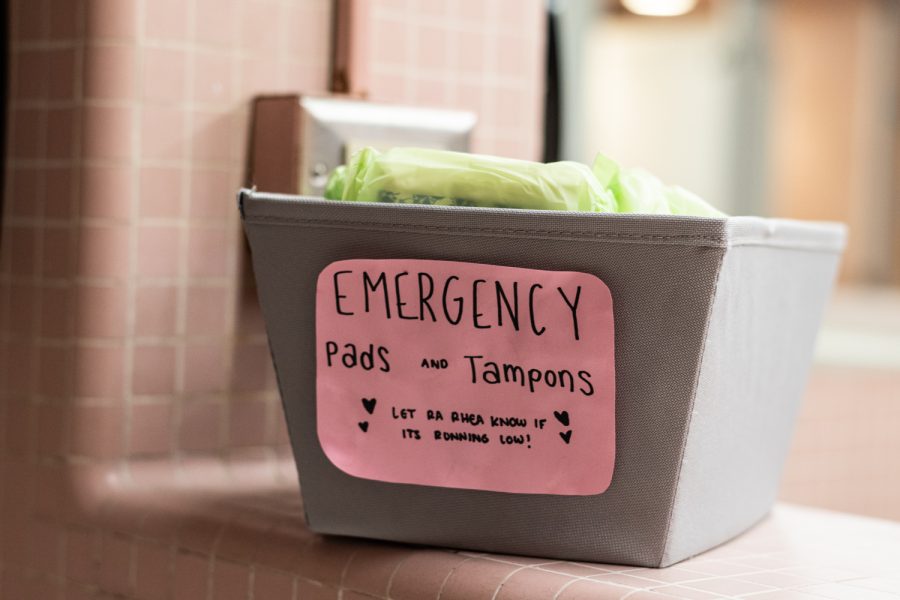ASWSU resolution providing free menstrual products on campus moves forward
Senators’ efforts lost traction last year despite Washington state resolution
Free menstrual products rest in Regents Hall, Oct. 14.
October 20, 2022
WSU Housing and Residence Life has ordered menstrual product dispensers after an ASWSU Senate resolution sought to provide the products in every campus restroom by the end of the academic year.
“Sometimes students have to choose between their basic needs [menstrual products], like ‘am I gonna pay for my rent or my food?’ Having additionally to worry about things to keep yourself clean shouldn’t be a stressor for students because we already have so many things going on,” said Sen. Gabrielle Lund.
Lund, who authored the resolution, is working with WSU President Kirk Schulz and WSU Pullman Chancellor Elizabeth Chilton, to implement the resolution, she said. The first phase will include placing menstrual products in all the female and gender-neutral bathrooms. Once the phase is complete, they will place them in all bathrooms.
Lund said she believes the plan will be refined as the year progresses, and the range and type of menstrual health products provided will expand over time.
“One of the big ones [barriers to the resolution] is just funding, in terms of like, ‘how are we gonna accomplish this?’ like which budgets is it gonna come from,” she said.
Although Housing and Residence Life has already ordered the menstrual products dispenser machines for phase one, Lund said she does not have a definitive answer in relation to where funding will come from. Housing and Residence Life will order the rest of the machines by the end of next year.
Lund said her first experience as a residence advisor in 2019 made her aware of the lack of menstrual products provided in the dorms.
When she was a freshman in Orton Hall, Lund’s RA used her own floor funds to provide menstrual products and condoms for the students on their floor. As Lund stepped into her role as an RA the following year, she did the same, she said.
“Basically it’s up to the discretion of the RED [residential education director], and if there’s intersect with the RAs or the RED themselves to implement free menstrual products, but it’s a building-by-building basis. In order for that to happen, there has to be that internal push for it, but it wasn’t a system-wide thing,” she said.
Sen. Diana Rios said the new resolution is meant to expand on last year’s resolution.
“We have menstrual products that are free in some buildings on campus, but not in the older ones and not in residence halls,” Rios said. “For example, I lived in Stevenson when I was a freshman, and you had to go all the way down to the lobby or to the gym if you wanted to get some free menstrual products.”
Lund said she wanted to make the resolution a priority and keep the momentum going as it lost traction in 2021.
As she researched the issue, she said she came across a Washington state resolution, mandating that all higher education institutions have to provide menstrual products in every gender-neutral and female-identifying restroom for free across all their facilities on campus.
Lund said knowing the state law was passed but that it had not yet been implemented on campus prompted conversations with people within residence life and on campus.
There are about 9,000-10,000 female-identifying students at WSU, almost all of which live in the residence halls at some point during their college career, she said.
“The biggest takeaway I found when writing the resolution was just about period poverty and that it’s a very real thing that impacts students, especially after the pandemic. It impacts students who are low income, from a rural background, of a minority background, first-generation and all those demographics. They range on average about a third of our student population.”
Lund said half of WSU’s population needs menstrual products to stay sanitary and be healthy, and that if items like soap and toilet paper are free, menstrual products should be as well.
The recently passed resolution differs from a similar resolution last year, which she co-authored with Sen. Nikolai Sublett, primarily in its implementation. She said people were on board with last year’s resolution, but she felt like she failed to execute it properly as she adjusted to her role as a new senator.
“I lost momentum, and there was a change in leadership, so that I just didn’t take it as far as I wanted to last year. With ASWSU on the senate side, we’re able to reintroduce bills of previous years, whether they’re ours or not … it’s mainly different in that we’re going farther with it now than we were originally able to last year,” she said.
Lund said one of her personal goals is to see free menstrual products in all residence halls and bathrooms on campus by the end of spring 2023.
“I want to make campus more accessible for students like me who didn’t have all the financial resources, who barely got here, who are just struggling to feel like they belong. This is one of those ways where I really wanted to give back to the university” she said.
Rios said many administrators respond to ASWSU promptly and are quick to work with senators.
“The timeline can be either a whole year, just like Nikolai Sublett’s vending machine, he passed it around this time and it’s expected to be implemented within the next few months because of supply and all this other stuff,” she said.
Lund said that when one institution starts making a change, others will follow and that her hope for WSU pursuing this policy action will serve as a model to other institutions in the U.S.























